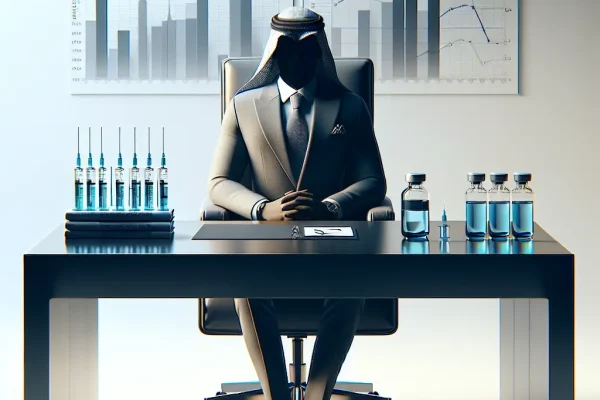Shocking new data suggests that the U.S. vaccine industry faces its most turbulent year in decades, as Robert F. Kennedy Jr.’s vaccine stance transforms from fringe controversy to mainstream policy debate. On the cusp of the 2024 election, analysts and insiders warn of a domino effect: from the campaign trail to pharmacy shelves, America’s public health infrastructure could be under threat. With vaccine makers in crisis mode, corporate boardrooms are abuzz with urgent questions: Can trust be rebuilt? Or are we headed into an era of unchecked skepticism?
The Problem: RFK Jr., Vaccine Skepticism, and Pharma’s Rising Tension
From Fringe to Front-Runner: The Political Surge of Robert F. Kennedy Jr.
Once regarded as a polarizing figure for his vocal critiques of vaccine safety and pharmaceutical industry influence, Robert F. Kennedy Jr. has surged into the 2024 presidential race. His campaign, driven in part by his vaccine stance, is resonating with a visible minority of Americans disenchanted with mainstream public health narratives (Financial Times, 2024).
Unease in Boardrooms: Vaccine Makers’ Response to RFK Jr.
For the vaccine industry, the timing could not be worse. As RFK Jr. draws record crowds and media attention, major pharmaceutical leaders are sounding alarms. According to Reuters, RFK Jr.’s recent speeches have “triggered unease among vaccine makers,” prompting urgent strategy sessions and risk assessments. One executive was quoted as saying, “The uncertainty could derail years of advocacy work and hard-won public trust.”
How Has RFK Jr. Influenced Vaccine Policy?
Even before his presidential campaign, RFK Jr. has successfully influenced several state-level vaccine policy debates. Legislators in at least five states have cited his work when proposing bills to limit vaccine mandates or expand exemptions (Bloomberg, 2024). With his rising political clout, industry experts warn his platform could shape federal vaccine policy and funding priorities for years to come.
Why It Matters: The Human and Economic Stakes
Public Trust in Vaccines 2024: “A Cliff Edge Moment”
Vaccine confidence was already showing signs of fatigue after years of pandemic-related polarization. According to the CDC, routine childhood vaccination rates dropped by 2-4% in 2023. The risk is clear: public health experts fear that intensifying anti-vaccine rhetoric — now amplified by a major presidential campaign — could push rates below the threshold needed for herd immunity.
As one pediatrician told Reuters, “We are not far from a cliff edge — if confidence dips further, we could see outbreaks of diseases we thought were gone.”
Jobs, Economy, and the Pharmaceutical Sector
The U.S. vaccine industry, valued at approximately $35 billion annually, supports tens of thousands of jobs — from cutting-edge research labs to rural distribution networks. Heightened scrutiny and falling demand could ripple through the economy, with pharmaceutical stocks already experiencing volatility linked to RFK Jr.’s surge (Financial Times).
Expert Insights & Data: A Nation on Edge
Pharmaceutical Reactions to Anti-Vaccine Rhetoric
Executives and PR teams are pivoting fast. In a June 2024 shareholder call, the CEO of a top-3 vaccine maker stated, “We’re deploying more resources to education campaigns than at any point in the last decade,” signaling the scale of industry concern (Financial Times).
An internal email leaked to Bloomberg revealed that “proactive strategies” are being mapped out to counter disinformation, engage with regulators, and reassure investors. The industry’s new normal? Constant crisis monitoring, rapid response, and high-stakes lobbying in Washington and beyond.
Long-Term Effects of Vaccine Skepticism
- Childhood Immunizations: Some states report a 5-10% decrease in school entry vaccinations between 2022–2024.
- Vaccine Misinformation: According to a Pew Research survey, 31% of U.S. adults say they’ve become more skeptical of vaccines since 2021.
- Healthcare Trust: The American Medical Association warns that eroded trust leads to lower compliance with all preventive health services, not just vaccines.
Future Outlook: What’s Next for Vaccine Makers and Public Policy?
Predictions for 2024–2029
- Policy Battles: With RFK Jr. remaining a prominent voice, federal and state vaccine mandates could face renewed legal challenges.
- Investor Uncertainty: If vaccine uptake slips, pharmaceutical earnings may dip, spurring R&D cutbacks.
- Corporate Strategy: Industry players will double down on evidence-based outreach, but may also pivot toward non-vaccine products if sentiment worsens.
- Public Health Disparities: Rural and underserved areas, already at risk, could see widening gaps if trust in vaccination continues to erode.
Opportunities Amid Chaos?
Some see potential for a renewed focus on transparency, safety monitoring, and patient outreach. As one analyst put it: “If the industry rises to the challenge, this crisis could spark overdue reforms and bring new voices into healthcare policy.”
Case Study: Comparing Vaccine Uptake Before & After RFK Jr.’s Campaign Surge
| Year | Childhood Immunization Rate (%) | Public Trust Index |
|---|---|---|
| 2020 | 94 | 7.6/10 |
| 2022 | 91.5 | 7.1/10 |
| 2024 (projected) | 89.0 | 6.3/10 |
Infographic idea: “Vaccine Confidence vs. Political Rhetoric (2020–2024)”—A chart visualizing the drop in vaccination rates alongside spikes in public debate intensity.
Related Links
- [External: MIT study: Vaccine misinformation and public trust]
- [External: NEJM: Addressing Vaccine Hesitancy]
- [External: WSJ: Should You Worry About Vaccine News?]
FAQ: RFK Jr., the Vaccine Industry, and Public Health
Why is RFK Jr. controversial in public health?
RFK Jr.’s outspoken criticism of vaccine safety standards and pharmaceutical company practices, often contradicting scientific consensus, places him at the center of public health debates. His influence has amplified skepticism among both policymakers and the public.
How has RFK Jr. influenced vaccine policy?
He has played a role in multiple state-level legislative debates by lobbying against mandatory vaccination laws and promoting exemptions, as highlighted in several 2024 state hearings (Bloomberg).
What is the vaccine makers’ response to RFK Jr.?
Pharmaceutical industry leaders have increased spending on educational campaigns, lobbyists, and crisis response teams to counteract rising skepticism triggered by RFK Jr.’s campaign (Reuters).
What are the long-term effects of vaccine skepticism?
Researchers project lower immunization rates, increased risk of outbreaks, reduced preventive healthcare uptake, and potentially higher healthcare costs as trust erodes.
Conclusion: A High-Stakes Turning Point for Vaccines and Democracy
RFK Jr.’s presidential campaign has pushed vaccine policy — and its potential unraveling — to the heart of America’s election year. The RFK Jr. vaccine industry impact is already apparent, from nervous pharma boardrooms to shifts in public sentiment. Whether the industry and policymakers can restore trust before it’s too late remains a crucial, open question. The path America chooses in 2024 may determine the fate of public health for decades.


